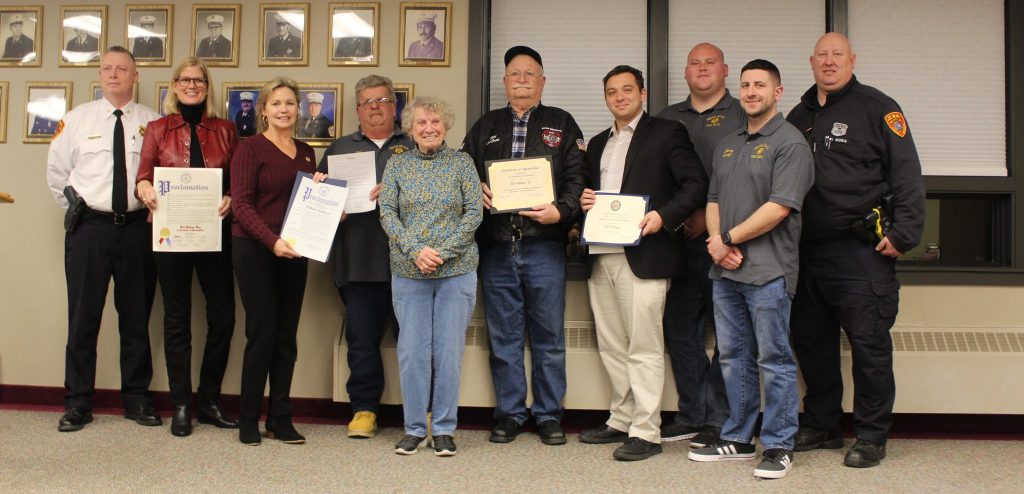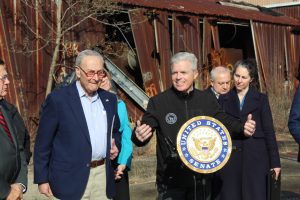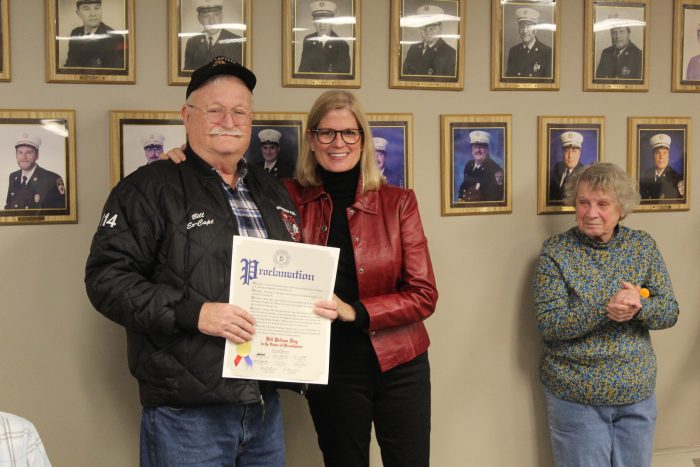Save the date! Sachem Public Library, 150 Holbrook Road, Holbrook hosts a Job Fair sponsored by the Suffolk County One-Stop Employment Center on Tuesday, Feb. 28 from 10 a.m. to noon. Representatives from Amazon, American Regent, Biocogent, LLC, NYS Solar, East/West Industries, Well Life Network, New York State Department of Corrections and Community Supervision, Winters Bros Waste Systems and more will be on hand to discuss job opportunities. Bring your resume and dress for success. Call 631-585-5844 for more information.
Suffolk DA’s office welcomes emotional support dog

The Suffolk County District Attorney’s Office welcomed its newest hire, an emotional support canine named Tillman III, on Tuesday, Feb. 14, at the William J. Lindsay County Complex in Hauppauge.

Tillman is a 2-year-old Lab/golden retriever mix, bred and trained as a facility dog by Medford-based Canine Companions. Assistant District Attorney Melissa Grier, of the Child Abuse and Domestic Violence Bureau, paired with Tillman, who will assist her as well as victims, witnesses and officers during traumatic events.
“This is a tough system for victims, especially child victims,” District Attorney Ray Tierney (R) said. Tillman is “very comforting, and it’s just a good opportunity to help the kids with a very recognizable and lovable thing in a very unrecognizable and tough situation.”
Together, Tierney and Tillman strolled through the various rooms and hallways throughout the office building, the staff greeting their newest colleague with delight.
Sound Beach civic honors past president, meets new 7th Precinct inspector
The Sound Beach Civic Association met on Monday, Feb. 13, at the Sound Beach Firehouse, joined by public officials, first responders and special honoree Bill Pellenz.
A past president and longtime civic member who also accrued over 50 years in the Sound Beach Fire Department, Pellenz was recognized for his contributions to the greater area. Town of Brookhaven Councilwoman Jane Bonner (R-Rocky Point) presented Pellenz with a town proclamation.
Suffolk County Legislator Sarah Anker (D-Mount Sinai) recognized Pellenz for his commitment to public safety. She recounted the many challenges faced in planning and launching the North Shore Rail Trail, which formally opened last summer.
Anker said Pellenz was instrumental in bringing attention to key safety needs for the trail. “He understands where to go with issues,” she said. “We were able to make additional safety measures because of you, Bill.”

Representing U.S. Congressman Nick LaLota (R-NY1) was Peter Ganley, who presented Pellenz with a certificate of congressional recognition, particularly noting his efforts to support veterans throughout the hamlet.
William Rosasco, chief of the Sound Beach Fire Department, chronicled Pellenz’s long service to the department, starting as a probationary firefighter and working his way up the ranks to captain of Engine Company 2.
“In the 36 years that I’ve been a member of this department, it’s been a pleasure working with Bill and being able to call him a friend,” Rosasco said.
SBCA president Bea Ruberto discussed Pellenz’s several contributions within the civic, notably to Veterans Memorial Park.
“On behalf of the Sound Beach Civic Association, I want to thank you for all the work that you have done for this organization and the community,” she said. “Also, I want to thank you for all of the work that you will do,” to which Pellenz responded: “I’m not going anywhere.”
General meeting

Following the ceremony, the civic held a brief meeting. Members were introduced to William Doherty, the 7th Precinct’s new inspector. In a brief statement to the body, he referred to his recent promotion as “the cherry on top of my career.”
“I look forward to working with everyone in this room through your elected officials and through my community liaison officers,” he said. “I tell you in my heart of hearts that this is the assignment that I wanted,” adding, “I don’t think I would have chosen any other precinct but the 7th.”
Ruberto reported that the civic would soon welcome a student volunteer from the Rocky Point school district, who will attend meetings.
“That’s one of the things that we really try to do,” she said. “We try to work with young people in our community.”
Following adjournment, the attendees enjoyed cake in Pellenz’s honor.
As vehicle thefts surge, Suffolk police detective warns against leaving key fobs in cars
The Suffolk County Police Department has observed a recent uptick in stolen vehicles and now urges residents to take precautions.
Detective Richard Marra of SCPD offered a brief history of the crime phenomenon in a phone interview. While vehicle theft cases have been recurrent, the detective noted that the crime is relatively preventable.
“Ninety percent of the cars that are stolen are probably stolen because [drivers] leave the key fobs in the car,” he said.
Marra said the police department first noticed the trend about three years ago when an organized out-of-state group started targeting luxury models.
“We had a group of guys coming out of New Jersey, mostly from Newark, and they would go to the more affluent neighborhoods,” he said. “They’d come in a van, walk down the street and look for any kind of foreign car.”
Thieves often sought out vehicles with the mirrors folded open. This, Marra said, was an indicator that the vehicle was unlocked.
If the key fob was left inside, they would easily steal the vehicle. If not, they may rummage through it for hidden valuables.
“Three years ago, it was crazy,” Marra said. “It slowed down a little bit in the last eight months, but we still have a lot of thefts of cars because the key fobs are left in the car.”
The SCPD detective said that the New Jersey bunch often resold their stolen cars on the secondary market. In a highly coordinated manner, they would steal the cars, drive to New Jersey, remove any GPS trackers and then prepare them for international shipment.
“When they had a container ready, they put them on the container, and it was usually going to South Africa,” Marra said.
While the group from New Jersey had targeted luxury models, some vehicle thieves are less interested in the car’s resale value than its utility.
Marra said some would use the vehicle to temporarily transport drugs or steal catalytic converters, then discard it. While victims of this variety of theft often retrieved their stolen cars, its condition could be irreversibly impaired.
“The ones that are taking just any car — anything that happens to be left with the fob in it — may drive it around for a day or two and then leave it somewhere,” he said. “Sometimes it’s destroyed, sometimes it’s not, but most of the time it’s not in the shape you left it in.”
The spike in vehicle theft follows another auto theft crime that has hit the county, the theft of catalytic converters. [See story, “Catalytic converter theft on the rise in Suffolk County,” TBR News Media website, Feb. 26, 2022.]
Marra indicated that catalytic converter theft has fallen off substantially in recent months due primarily to coordinated arrests conducted with the federal government.
For residents to protect themselves from vehicle theft, he said there is a simple solution — taking their fobs with them as they exit their cars.
“If people would take their key fobs with them and never leave them in the car, I’d say 90 to 95% of the car thefts would go down,” the detective said. “You just have to keep your keys in your pocket instead of leaving them in the console or the glove compartment.”
He added, “I know it’s nice to just jump in and drive away — but then everybody could jump in and drive away.”
Commack FD to host 13th annual Glen Ciano blood drive Feb. 4

Suffolk County Executive Steve Bellone, Suffolk County Police Commissioner Rodney K. Harrison and Commack Fire District Commissioner Pat Fazio joined Susan Ciano, widow of Suffolk County Police Officer Glen Ciano, and representatives from New York Blood Center during a press conference on February 3 at the Commack Fire Department to announce the 13th annual blood drive named in memory of Officer Ciano on Saturday, Feb. 4.
There has been a chronic shortage of blood supplies in New York since the pandemic and blood supplies remain below the ideal five-day safety level. Types O-, O+, B-, and A- continue to hover at less than two-day levels.
The annual event is held in honor of Officer Ciano, who was responding to a call when he was killed by a drunk driver in Commack on February 22, 2009.
The blood drive will be held at the Commack Fire Department, located at 6309 Jericho Turnpike in Commack, on February 4 from 8 a.m. to 5 p.m. For more information, call 631-499-6690.
School bus safety program sparks dialogue within Suffolk County government

The Suffolk County School Bus Safety Program has drawn scrutiny from Republican county officials targeting the program for alleged mismanagement.
Enacted unanimously by the county Legislature in 2021, this traffic safety program uses cameras attached near the stop arm of school buses to enforce the New York Vehicle and Traffic Law. The county has partnered with Virginia-based BusPatrol to operate the program.
Under state law, offenders caught passing buses while the stop arm is extended receive a $250 fine. The county code states, “net proceeds of any penalty … shall be expended for programs related to improving traffic safety and/or school district safety in Suffolk County.”
County Comptroller John Kennedy Jr. (R) recently announced his office is conducting an audit of the School Bus Safety program. He stated the program had captured his attention when numerous residents complained about receiving potentially erroneous violations.
“My interest in any program is always that a program is being operated as the laws that adopted it … sought to have it operate,” Kennedy said. “How is the revenue that’s being collected from the program being allocated? Is it being done under the terms of the contract? Is the vendor fulfilling all of their requirements?”
He added, “That’s the audit function, and it is universal across the board.”
Legislative purpose
Marykate Guilfoyle, a spokesperson for Suffolk County Executive Steve Bellone (D), summarized the motive for developing the program in the first place.
“The goal of the School Bus Safety program is to protect children as they get on and off the bus and to reduce the number of drivers illegally passing stopped school buses, which endangers the lives of students,” Guilfoyle said in an email. “The program is completely violator funded, and county proceeds are used to support public safety, traffic safety and school safety initiatives.”
County Legislator Kara Hahn (D-Setauket) defended the School Bus Safety program. She said her office’s most frequent complaints are related to roadway safety and other traffic concerns.
“Red light cameras and school bus cameras are a way to prevent death and injuries without needing a paid police officer at every intersection and following every bus,” she said. “It’s a very efficient way for providing the consequence for breaking the rules of the road.”
Before the program took effect, Hahn added, few violators ever got caught. Today, they receive a fine, incentivizing better roadway behavior and creating a safer traffic environment.
“Now people have to change their behavior to no longer do the illegal action that puts people’s lives at risk,” the county legislator said.
Questions over potential misapplication
County Legislator Rob Trotta (R-Fort Salonga) said the School Bus Safety program is one of the few measures for which he wishes he could rescind his “yes” vote. He said the Legislature was misled when the program was pitched.
Figures obtained by Trotta indicate the program grossed $23 million last year, with $13 million retained by the county and the outstanding $10 million collected by the vendor. Kennedy estimated the county government netted approximately $11 million.
“We don’t have all the net revenue,” Kennedy said. “That’s been another consequence of the hack” against the county government in September. For more on this ransomware event, see story, “Suffolk County cyberattack offers a window into the dangers of the digital age,” Nov. 17, also TBR News Media website.
By statute, the net proceeds generated by the School Bus Safety program must support various educational programs related to school bus and traffic safety. Asked how the revenue is being spent, an administration official said the 2022 revenue figures are still being finalized.
Guilfoyle, however, cited specific examples of how the revenue supports countywide traffic education initiatives: “Examples of the county’s efforts include dedicating more than $1 million to school districts and $125,000 in [public service announcements] during the back-to-school months to educate drivers on the state law surrounding stopping for buses.”
Trotta viewed the school bus program as a lucrative moneymaker for the county and vendor rather than a measure promoting bus safety. He said the law is applied unfairly, ticketing busy multilane corridors in the same manner as residential neighborhoods.
“I’ve checked with all the school districts, and kids aren’t crossing major thoroughfares,” Trotta said. “I’m all for giving a ticket to someone who passes a school bus on a residential avenue because it’s dangerous. I’m not at all for 1,000 people on Jericho Turnpike getting tickets.”
While the county code imposes rigid reporting requirements regarding expenditures of revenues generated from the program, Kennedy said he has yet to see any reports to date.
Competing perspectives
Following an initial spike when programs such as this are first instituted, Hahn said offenses start to wane “because people begin to change their behaviors — they stop at red lights because they’re afraid of getting a ticket.”
In time, the legislator added, drivers throughout Suffolk “will no longer go around stopped school buses,” but “if they choose to break the law, they will get tickets.”
Trotta said he is pushing to repeal the School Bus Safety program altogether. “The reality is it’s a sham, and it’s not what we were told it was going to be,” he said.
While Kennedy acknowledged the importance of traffic safety, he held that the audit is to determine whether the program is administered correctly.
“I never want to see somebody blowing a stopped school bus sign — it’s just heinous,” the county comptroller said. “But if [the program] is not being operated in a fair and proper and consistent manner by the school bus drivers and the vendor … then it’s a problem.”
Kennedy expects the audit to be finalized by the second quarter of 2023.
Suffolk County libraries set record for digital book checkouts in 2022

The Public Libraries of Suffolk County recently announced that it reached a record-breaking three million digital book checkouts on Livebrary.com in 2022. This milestone illustrates the continued growth and importance of library lending of e-books, audiobooks and other digital media as well as the library’s success in serving all members of the community.
Livebrary, consisting of 56 libraries in Suffolk County, is #13 of all public library consortia, one of 129 public library systems worldwide and third in New York that surpassed one million checkouts last calendar year.
The Public Libraries of Suffolk County have been providing readers 24/7 access to e-books and audiobooks for several years through the award-winning Libby app, the library reading app created by OverDrive. The large collection serves readers of all ages and interests, and usage has grown every year.
“The Public Libraries of Suffolk County continue to provide access to a diverse collection of e-books and audiobooks giving readers the opportunity to connect with a wealth of information and entertainment from wherever they may be,” said Kevin Verbesey, Director of the Suffolk Cooperative Library System.
The highest-circulating title Livebrary readers borrowed in 2022 was The Last Thing He Told Me by internationally bestselling author Laura Dave. The instant #1 New York Times bestselling mystery and Reese Witherspoon Book Club pick is about a woman searching for the truth about her husband’s disappearance…at any cost. The top-circulating genre, romance, represents the most popular in a vast catalog that also includes mystery, fantasy, children/young adult and more.
The top five e-book titles borrowed through Livebrary’s digital collection in 2022 were:
1. Verity by Colleen Hoover
2. The Last Thing He Told Me by Laura Dave
3. Wish You Were Here by Jodi Picoult
4. The Seven Husbands of Evelyn Hugo by Taylor Jenkins Reid
5. The Paris Apartment by Lucy Foley
The top five audiobook titles borrowed through Livebrary’s digital collection in 2022 were:
1. The Last Thing He Told Me by Laura Dave
2. Where the Crawdads Sing by Delia Owens
3. The Paris Apartment by Lucy Foley
4. The Maid by Nita Prose
5. Apples Never Fall by Liane Moriarty
Suffolk County residents just need a valid library card from a member library to access digital books from Livebrary’s OverDrive-powered digital collection.
Readers can use any major device, including Apple®, Android™, Chromebook™ and Kindle® (U.S. only).
Download the Libby app or visit Livebrary.com to get started borrowing e-books, audiobooks and more anytime, anywhere.◆
This article originally appeared in TBR News Media’s Prime Times supplement on Jan. 26.
Editorial: Birds of a feather, in our cars together
County officials are currently engaged in a contentious debate over the Suffolk County School Bus Safety Program.
Proponents say the program bolsters traffic safety around school buses. Detractors argue the program represents little more than a convenient revenue generator to plug holes in the county budget.
Promoting safety on public roads remains a priority regardless of where one stands on the program itself.
New York State Vehicle and Traffic Law is a worthy undertaking to protect school children. Whether cameras remain strapped to school buses, drivers should always be vigilant near a school bus with flashing yellow lights.
Under no circumstances should one ever pass a school bus while the stop arm is extended.
But roadway safety is not isolated to school buses. The U.S. Department of Transportation National Highway Traffic Safety Administration estimates that 42,915 people died in traffic crashes in 2021. That’s a 10.5% increase from the previous year.
NHTSA reports collected from 2016 to 2020 indicate that nearly 1,000 vehicular fatalities occurred on Long Island, more than half of which were in Suffolk County.
Statistics aside, we read almost weekly reports of individuals involved in significant motor vehicle accidents within our coverage area. Many times, they include serious bodily injury to the victims. At other times, they can be fatal.
Long Island is unique in its autocentric character. Development of our Island happened nearly a century ago, and the suburbanization of Long Island happened almost simultaneously with the growth of the American automobile industry.
Planners, notably Robert Moses, saw the car as offering individual autonomy. They viewed the Long Island Dream as an expression of that individualistic promise.
Unfortunately, they failed to provide sufficient mass transit infrastructure, twisting a dream into our difficult reality.
Today, Long Islanders are glued to their cars. For most of us, getting to work requires a car. Having success in our professional and social lives requires a car. For those who do not live within walking distance of a train station, accessing the rail requires a car.
All of this highlights the need to drive responsibly.
When we operate a moving vehicle, we harness the power to unleash great bodily injury — even death — upon ourselves and others. At the same time, we can monitor our decisions and protect our fellows on the roads.
We can make our roads safer by following the speed limits, driving sober and taking extra precautions when we get behind the wheel.
Unfortunately, we Long Islanders are stuck in our cars for the foreseeable future. But we are stuck together.
Let us be mindful of our neighbors. Let us regard the lives of other drivers as we would our family members or friends.
We can help make these roads safer for all through our positive choices today.
Schumer announces $450K to help demolish buildings at Lawrence Aviation
- Community
- Environment & Nature
- Government
- Local Government
- New York State Government
- Politics
- Port Jefferson Station/Terryville
- Port Times Record
- Suffolk County
- Suffolk County Government
- Times of Huntington-Northport
- Times of Middle Country
- Times of Smithtown
- Town of Brookhaven
- Village Beacon Record
- Village Times Herald

Public officials of all levels of government, business and civic leaders, and community members gathered Monday, Jan. 9, before a derelict building at the Lawrence Aviation Superfund site in Port Jefferson Station.
Once a dumping ground for toxic waste, policymakers are now plotting a course of action for this 126-acre property. After taking decades to rid the site of harmful contaminants, officials and community groups are working toward an ambitious proposal to convert the site into a multipurpose community hub, accommodating a solar farm, a railyard and open space for local residents.
U.S. Senate Majority Leader Chuck Schumer (D-NY) called the press conference to announce the injection of $450,000 in federal funds secured through the recent omnibus budget. This money will be used to help demolish the remaining buildings at the property.
“We’re here today to showcase one of the final puzzle pieces needed to demo 14 dangerous buildings here,” Schumer said. “I am here today to say that the train that is on this journey is ready to leave the station.”
The Senate majority leader added that these funds would advance three community goals. “One, a railroad-use project to help the LIRR with logistics; industrial redevelopment of a 5-megawatt solar farm,” and lastly, add 50 construction jobs to the local economy.

Suffolk County Executive Steve Bellone (D) described the considerable intergovernmental coordination and logistical obstacles to get to this stage.
“This project, as reflected by all of the people that have come together and all the levels of government, is critically important to the community,” he said.
Town of Brookhaven Supervisor Ed Romaine (R) discussed the long and arduous road to revitalizing the site and the decades that have passed as this community blight lay barren.
“These buildings have been condemned for over 25 years,” he said. “This has been a Superfund site for almost 25 years. Finally, we will see these buildings come down.”
Former New York State Assemblyman Steve Englebright (D-Setauket) also attended the press event. During his time in Albany, he championed the site’s conversion for environmental and community purposes.
“We have a plan that will enhance our community and create new jobs,” he said. “This property stood out as a place in peril of a potentially bad decision,” adding, “Instead, we have a very thoughtful plan.”
Englebright, a geologist by trade, also touched upon the environmental impacts that redevelopment will offer through these plans. He said local harbors, groundwater and surface waters would benefit as this dark episode in local history concludes.

“The harbor, which is the beginning of our town, has been poisoned by the solvents that were poured into the ground here,” the former assemblyman said. “That is a thing of the past because of the federal involvement with the Superfund cleanup.”
He added, “All the levels of government are working together here, which is a beautiful thing. It’s a model for what government should be able to do all the time.”
Jen Dzvonar, president of the Port Jefferson Station/Terryville Chamber of Commerce, also offered her perspective. She said public improvements such as these indirectly support and promote local businesses.
“Any improvement in Port Jefferson Station is major,” she said. “By getting the blight away from the area, we will increase businesses. A solar farm is coming. They’re creating 50 construction jobs. It just heightens Port Jefferson Station and the desire to come here.”
Representing the Village of Port Jefferson were Mayor Margot Garant and Deputy Mayor Kathianne Snaden. Both stressed the importance of this undertaking, conveying their support for neighboring Port Jefferson Station in its community aspirations.
Garant viewed the plans as an opportunity to improve the Port Jefferson Branch line of the Long Island Rail Road. “We’re really in support of this because of the MTA portion of it,” she said. “To clean up this site, to put it back to public use, to not have the county paying taxes on it, is good for everybody.”
For Snaden, the project will bolster the village’s neighbors, representing a vital regional investment. “I think it’s great,” she said. “It’s a cleanup of the site. It’s knocking down these falling buildings, adding to the betterment of the entire community and the region at large.”
Schumer said the next step would be to ensure that the U.S. Department of Housing and Urban Development expedites these funds, ensuring the prompt demolition of the buildings and swift redevelopment of the site.
Theresa Whelan, Suffolk County Surrogate’s Court judge, dies at 60
Theresa Whelan, of Wading River, a longtime Suffolk County judge who served for more than 10 years in family court and most recently as the county’s Surrogate’s Court judge, died Monday, Dec. 26, after a courageous battle with cancer. She was 60.
Theresa Whelan always knew she wanted to be in public service. As a young attorney fresh out of Albany Law School, she began her legal career in 1988 as a Suffolk County assistant county attorney. She entered the court system in 1990 as a senior law clerk to Supreme Court Judge Eli Wagner, in Nassau County. She went on to work as a principal law clerk in Suffolk County for Supreme Court Judge Mary M. Werner and, later, Supreme Court Judge William B. Rebolini. During her 17 years in the supreme court, she worked in nearly every part, including civil litigation, guardianship, tax certiorari and condemnation cases, as well as matrimonial matters.
She eventually took the bench herself in 2008 after she was elected to serve as a judge in Suffolk County Family Court. There, she heard primarily child abuse and neglect cases and presided over Family Treatment Court, where she worked to safely reunite families. Whelan became Suffolk County’s Surrogate in 2019, presiding over proceedings involving wills, trusts and estates as well as guardianship matters. She retired in the summer of 2022, marking 32 years within the New York State court system.
Known for her commitment to improving court practices to better serve the needs of the public, Whelan mobilized several initiatives that helped families and children and that expanded access to justice for all court users. She was appointed Supervising Judge of the Suffolk County Family Court in 2016, and one of the many reforms she spearheaded was providing remote access to temporary orders of protection, allowing individuals to petition the court from a hospital, a police precinct or a shelter. She was a catalyst of the FOCUS (Family Overcoming Crisis through Unified Services) initiative, a program that expedites access to services that address the trauma and developmental needs of children and parents in the court system.
She also served as lead judge of the Suffolk County Child Welfare Court Improvement Project, part of a statewide initiative to address court practices in cases where the court has removed children from their parents’ care. In 2016, Chief Administrative Judge Larry Marks appointed her to the Family Court Advisory and Rules Committee. In 2018, former New York Court of Appeals Chief Judge Janet DiFiore appointed her to the New York State Commission on Parental Representation, which is tasked with holding public hearings and reporting on the status and quality of lawyers representing parents in child welfare cases. Since 2016, Theresa Whelan had been the chair of Suffolk County’s Attorneys for Children Advisory Committee, which is responsible for considering the qualifications of new applicants to the Attorneys for Children panel as well as reviewing the recertification applications for existing lawyers.
An active member of the Suffolk County Bar Association, Whelan was co-chair of the Family Court Committee from 2013 to 2016 and lectured for the association’s law academy and other legal organizations. As a member of the Attorney for Child Task Force, she and the other members received the Suffolk County Bar Association’s President’s Award in 2016 for their work. She was also a member and past president of the Suffolk County Women’s Bar Association.
In March of 2022, in recognition of her leadership and commitment to improving the lives of children and families, Whelan was honored at a Women’s History Month celebration, “Women Providing Healing, Promoting Hope,” presented by Suffolk County District Administrative Judge Andrew A. Crecca and the Suffolk County Women in the Courts Committee. In June, Whelan was awarded the Marilyn R. Menge Award at the Women’s Bar Association of the State of New York 2022 Convention.
Prior to beginning her legal career, she received a Bachelor of Arts degree in English and a Master of Science degree in Policy Analysis and Public Management from the State University of New York at Stony Brook.
Her devotion to her family was boundless. She and her husband, Suffolk County Supreme Court Justice Thomas F. Whelan, recently celebrated their 32nd wedding anniversary. Together they raised two children, Joseph and Erin. Whelan was a proud grandmother to Erin’s one-year-old daughter, Andrea.
In her spare time, Whelan enjoyed the outdoors. She could often be found hiking, kayaking or spending time at the beach. She ran in several half marathons in recent years.
She continued her dedication to the public good even after her cancer diagnosis, volunteering to participate in clinical trials, despite the risks, in hopes of helping find a cure. Her family, friends and former colleagues remember her as someone who braved challenges with grace and compassion. She will be dearly missed by all who knew her.
Theresa Whelan is survived by her husband, Justice Thomas F. Whelan; son, Joseph Whelan; daughter, Erin, her husband, Alex Meyers, and their daughter, Andrea; mother, Joan Bryant, and her husband John Bauer; brothers, Jack Bryant and Christopher Bryant; sisters, Vaughn Bogucki and Victoria Yule; together with many nieces and nephews.










